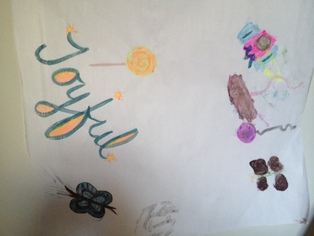Read this week's text - Isaiah 64:1-9  life that blooms in the desert life that blooms in the desert Have you ever played hide n seek with a young child? They simply can't stand to be hidden for long. Give it less than five minutes of us asking, "Where could she be?" and the child is waving her hand saying, "I'm here, I'm over here." And then on the flipside, at about the same age, a child often believes if he can't see you then you can't see him. Years ago, during moving day, a box fell beside my three year old niece. We all rushed to see if she was alright. And there she stood in the middle of the living room with her eyes closed. She wouldn't respond to us saying it was alright. She wouldn't open her eyes to see what had happened. She was taking comfort in believing that as long as she couldn't see what happened, we couldn't either. Seeing and being seen is not so straight forward. The writer believes God has hidden in anger. In their sin, they had become like a filthy cloth. The best translation is a menstruation cloth. The writer is saying that their lives had become like the object that collects proof that there is no life. Ask any couple trying to conceive what the onset of menstruation means - there is no life. So, has God hidden then or is it that they're lives no longer cultivate life. What does it mean when it feels as though our lives are no longer a proper environment for life to grow? What happens to our relationship with God when our lives become arid? At what point does it feel God has hidden as opposed to we have ceased to support life? We begin our journey of Advent pointing the finger at ourselves not at God. And yet so often when we believe God is hidden we fault God. We focus on the hidden part of the equation and not our part. I wonder if we are not a little bit like a child with her eyes closed. Not willing to look at what's going on, perhaps frightened by loud sounds. If I can't see Gd, then God can't see me either. The writer, the prophet is asking us to open our eyes and look around. I can't help but wonder if when we open our eyes, we will find that God is not hidden at all. In fact, God is beside us saying, "I can see you." And perhaps that is why we keep our eyes closed.
2 Comments
This week's text: Psalm 100  Julia and I painted this the night Mateo arrived. Julia and I painted this the night Mateo arrived. The most joyful noise I hear in my life right now is the sound of my grandson, Mateo's laugh. He's three months old and he has begun to laugh. My eldest son, Daniel, and his wife, Faith, adopted a little boy in August. We must wait until February to spread pictures electronically. But there was no wait in systematically falling more in love with him each day. One more sentence about our newest love? He's got these amazing chipmunk cheeks that are simply scrumptious! But the thing that has us in his grip right now is the giggle. It's buoyant and surprising. It's honest in the sense that it's so natural, physiological, as if reminding us that laughing is supposed to happen. When we laugh we our mind has been somehow jostled into clarity. When we smile, our muscles loosen and our mood lifts. When we laugh, we feel the physiological results of it. I love to laugh and I surround myself with funny people. For starters I'm married to one of the funniest people around - although don't tell him I said that because his jokes are so dry they make me thirsty. I can only take so much. I belong to a small group of women pastors who meet each week. They are hilarious and they think I am too, which is so generous. Here's my favorite story of late - We were talking about the kind of prayer requests we field on any given Sunday morning during the prayers of the people and one of them was asked "to pray for the people of Mallomar." I'm giggling as I write that - my eyes squint, my cheeks fill with something unknown and I am making repetitive throat sounds. (Indeed, we pray for the people of Mallomar and their fluffy friends, their rivers of chocolate...) And I can't imagine a Sunday worship service without laughter. The laughter usually begins with the worship team messing around with something before the service - a couple weeks ago, they greeted me by playing a song on the keyboard using a patch that sounded like someone yelping. Imaging yelping out the tune of a hymn. And my congregation generally speaking is completely fine laughing at me, whether I join them or not. I think that's healthy. Because I laugh at them, whether they join me or not too. "Make a joyful noise to the Lord," says the psalmist. "Serve the Lord with gladness," says the psalmist. Is laughter - in church, in conversation or even in private - a joyful noise unto the Lord? Without a disclaimer about how we ought not anthropomorphize God, I'd like to imagine God's response to our laughter quite similar to our response to little Mateo's. It sounds the same every time and yet we are just as thrilled with each note of his giggle song. We do the same things to get a laugh out of him and still we find delight in each responsive giggle. Here's the thing - to get a giggle out of us sometimes takes a lot of work. We are fortified against laughter sometimes, the fort built up by disappointment, disease, and daily news. Sometimes we think we must first get through the serious stuff before we can laugh - a pit that I fall into regularly with my husband always ready with the joke first and the answer second or third or fourth (for the love of God - I'm trying to ask a serious question here, can do you do me the favor of answering it first??!!) If you think about it, we as a culture are looking to satire to give us the news these days with the Daily Show, the Colbert Report and John Oliver's newish show "Last Week Tonight." We're starved for laughter amidst the disappointment, disease and daily news. Dr. Virginia Wiles, one of my beloved professors from New Brunswick Theological Seminary studied stand up comedy during her last sabbatical. Learn more in this article. I wonder if the psalmist would find his or her rank alongside these satirists? I wonder if the psalmist was surrounded by laughter? I wonder if the psalmist wished to be surrounded by laughter? I wonder if you wish to be surrounded by laughter? And I wonder what might happen if God attempted to get a giggle out of you sometime this week? But you, O Bethlehem of Ephrathah,  I love all forms of asters. I love all forms of asters. Years after having been raised in the Christian faith, years into bible studies with my peers, years into my own vocation as a minister of the gospel of Jesus Christ, I heard this passage for the first time. It is the only place I can tell where requirement is used in relationship to God. What does the Lord require of you? And the kicker is that it gives us an answer. It's not a rhetorical question. The prophet MIcah asks it and answers it according to the word of the Lord he has received, in his context, for the people of God at the time. What does the Lord require of you? Do Justice Love Kindness Walk Humbly These three things are our requirements as people of God. There is no mention of believing in the Lord Jesus Christ. Of course Jesus hadn't been born yet. There is no mention of believing in Messiah. There is no mention of keeping the commandments or the law. There is no mention of going to church. What does the Lord require of you? Do Justice Love Kindness Walk Humbly Which of these three is most difficult for you today? For us Presbyterians, "doing justice" is something we talk about all the time. So, I'm playing around with the middle requirement - Love Kindness. What does it mean for us to love kindness? What kind of life would we lead is kindness was the backdrop of everything we did and said? How would our relationships change if we loved inserting kindness above all else? Would our perspective on life change, and in what way, if we sought out kindness?
It's always been God's kindness that leads us to repentance. It's always been God's steadfast love that continues to call us into right relationship. This was true for Micah; it is true for us. How might kindness draw us into right relationship one again with God? |
Search this blog for a specific text or story:
I am grateful for
|

This work is licensed under a Creative Commons Attribution-NonCommercial-ShareAlike 3.0 Unported License.
